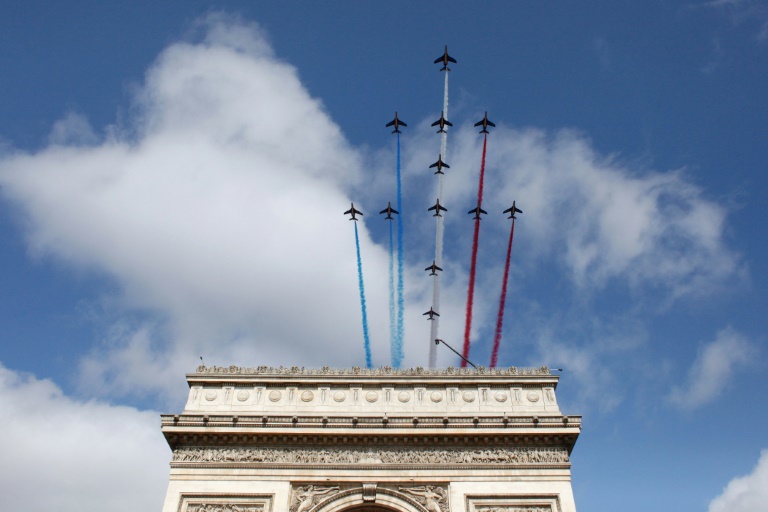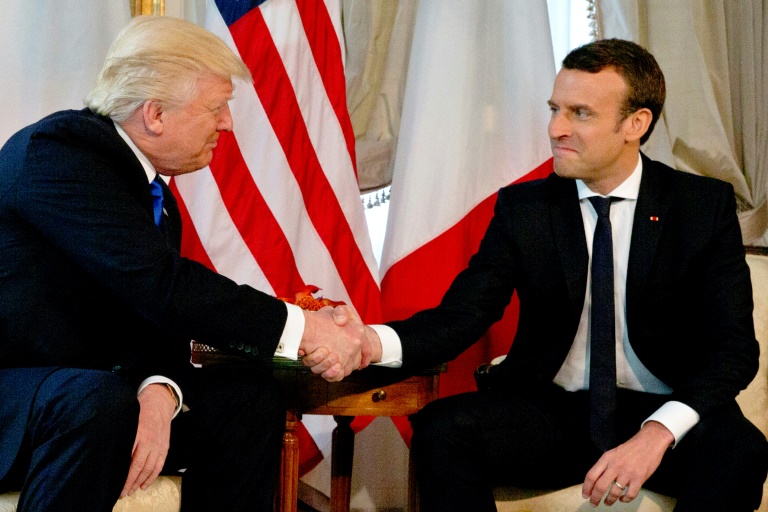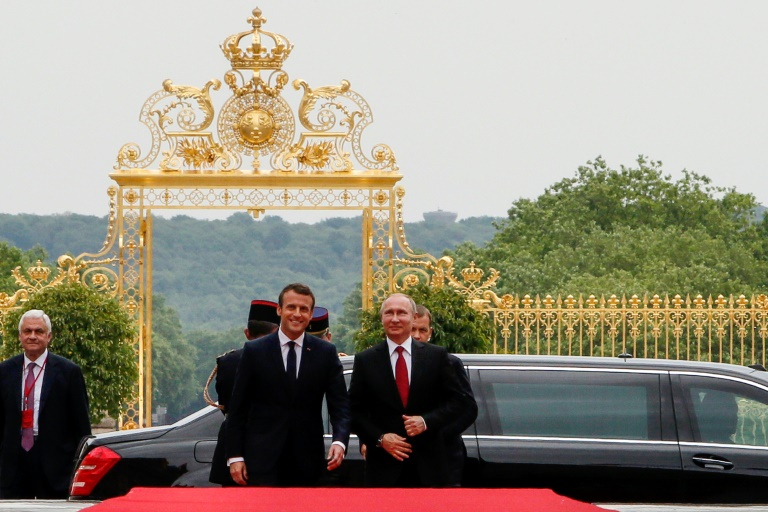Malema warns Ramaphosa: SA not ready for war in DRC
In London, Berlin, Brussels and Paris, European leaders are wondering how best to handle the unpredictable US president, whose nationalist “America First” agenda has upended assumptions about transatlantic relations.
Macron, a 39-year-old elected in May, hopes to build a relationship with the new occupant of the White House that might enable him to influence US policy or, at the least, help avoid serious strains between the EU and Washington.
There are already tensions over climate change and trade, while Trump was openly critical of the EU last year and snubbed a handshake with German Chancellor Angela Merkel during their first meeting in March.

French President Emmanuel Macron has invited US President Donald Trump to be his guest of honour for the July 14 Bastille Day ceremony
“It’s very difficult to play chess with a man whose strategy is a complete mystery and whose only consistency is his pursuit of American national interest,” foreign affairs expert Bertrand Badie of Sciences Po university in Paris told AFP. “To imagine that you might change his mind on something is simply mad.”
Macron has invited Trump to be his guest of honour for the July 14 Bastille Day ceremony when they will watch troops parade down the Champs-Elysees in Paris and mark 100 years since America entered World War I on France’s side.
– Eiffel Tower dinner –
Trump arrives on Thursday for talks with Macron set to focus on joint efforts to combat the Islamic State group in Iraq and Syria, where American and French troops are in action side-by-side.
They will then dine together in a Michelin-starred restaurant up the Eiffel Tower, enjoying the stunning views of the French capital along with their wives Melania and Brigitte.

US President Donald Trump (left) shakes hands with French President Emmanuel Macron on the sidelines of a NATO summit in Brussels on May 25, 2017
The two leaders appear to share little in common, with their views at odds on everything from globalisation to immigration, leading Macron to be described sometimes as the “anti-Trump” during his run for the French presidency this year.
As well as a huge generational gap — Trump is almost twice Macron’s age at 71 — there is scant evidence of any overlap of interests in their personal lives.
But sources in the French presidency insist that ties are healthy even after a muscular handshake seen as a battle of wills between the two of them when they first met at a NATO summit in May.
“The relationship is excellent,” said one member of Macron’s team on condition of anonymity.
Macron also criticised Trump’s decision to withdraw the United States from the global Paris climate change agreement last month and used the American’s own slogan against him, saying: “Make our planet great again.”
– Pragmatic approach –
Manuel Lafont-Rapnouil, an expert at the European Council on Foreign Relations think tank, said Macron had no choice but to try to build ties with the US president.

French President Emmanuel Macron welcomes Russia’s Vladimir Putin (right) to the Palace of Versailles on May 29, 2017
“Whatever you think, the United States is still the United States and we need them on lots of issues. You can’t just say ‘Trump is there so let’s wait until he’s gone’,” he told AFP. “Even if it is very difficult to handle someone as unpredictable as him, you need to try to salvage what you can.”
This pragmatic approach was echoed by government spokesman Christophe Castaner last week.
“Emmanuel Macron wants to try to prevent the president of the United States being isolated. He (Trump) sometimes takes decisions that we disagree with, on climate change for example,” Castaner told the LCI news channel.
“But we can do two things: either you say ‘we’re not speaking because you haven’t been nice’ or we can reach out to him to keep him in the circle,” he said.
Nearly 11,000 police officers will be on duty on Friday, with France in its highest state of alert after a string of terror attacks since 2015 that have killed more than 300 people.
At the beginning of July, police charged a 23-year-old suspected far-right activist with plotting to assassinate Macron at the Bastille Day parade.
An attack last year on July 14 plunged the country into mourning again when a truck ploughed into families enjoying a fireworks display in the southern Riviera city of Nice, leaving 86 dead. The IS group claimed responsibility.
Trump’s arrival in France as guest of honour on the country’s national day has provoked less criticism than British Prime Minister Theresa May’s decision to invite Trump for a state visit to Britain.
May faced pressure from opposition parties to rescind the invitation, and the threat of major protests encouraged the two sides to postpone the trip until 2018.
French green member of parliament Yannick Jadot has called Macron’s decision to invite Trump “a symbolic reward unworthy of the US president who has given the finger to humanity by withdrawing from the Paris climate agreement.”
Download our app and read this and other great stories on the move. Available for Android and iOS.